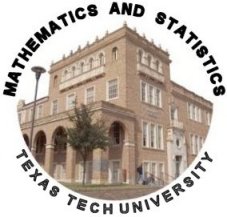
Texas Tech University, Department of Mathematics and Statistics
May 15th, 2019

|
16th Emmy Noether High School Mathematics Day
Texas Tech University, Department of Mathematics and Statistics May 15th, 2019 |
|
|
|
|
|
Raegan Higgins, Ph. D. Raegan Higgins didn't always love math. In her eyes, it was a class that everyone had to take. It wasn't hard nor was it easy; it just was. Upon placing out of Pre-Algebra in middle school, Raegan entered Algebra which quickly became her adversary. With little Pre-Algebra background, she struggled in the course she called "The Land of Unknowns." With a very encouraging no-nonsense teacher and parents who only asked for their daughter's best, Raegan excelled in Algebra and became an aspiring mathematician. In 2008, Raegan was one of the first two African-Americans to earn a doctoral degree in Mathematics from the University of Nebraska- Lincoln. She had officially become a mathematician. In that same year, she joined the faculty at Texas Tech University. Her primary research focuses on determining conditions in which solutions to differential-like equations eventually stay positive or negative. She now has her first doctoral student and has advised several master's students. Dr. Higgins has also published over 10 papers. Because of her own experience as a person of color pursuing a STEM degree, she understands the importance of creating supportive environments where underrepresented students can thrive. In 2013, Dr. Higgins co-founded Young Women in Mathematics (now The Raiders Chapters of the Association for Women in Mathematics). This group provides a unique opportunity for TTU women to empower, motivate, and support one another in a field where they may face obstacles due to their gender. In 2014, the West Texas Association for Women in Science recognized her as the Outstanding Woman Leader for her commitment to the education, training, and mentoring of women in STEM. Most recently, she became the co-director of the EDGE (Enhancing Diversity in Graduate Education) Program whose goal is to strengthen the ability of women students to successfully complete PhD programs in the mathematical sciences and place more women in visible leadership roles in the mathematics community. Raegan enjoys watching home improvement shows and bowling. She is a member of Delta Sigma Theta Sorority, Incorporated and is the president of the local alumnae chapter. Raegan and her handsome husband, Dr. Kamau Oginga Siwatu, are the proud parents two lovely children. Their daughter, Jalia, is an inquisitive eight-year old and son, Tendaji, is a fun-loving kindergartner. Aliza Wong, Ph.D. Aliza Wong had many career paths. When she was 7, she wanted to be a hair stylist. Unfortunately, a tragic haircut on her sister's Cinderella doll soon called that plan into question. The dream was completely dashed when Aliza, aged 9, unbeknownst to her parents, gave her little brother a "little" trim. The surprisingly geometrical chunk missing from the back of his head confirmed that Aliza's future would not include being a beauty consultant to the stars. Undeterred, Aliza soon realized that her next greatest love, reading, writing, learning, could provide the satisfaction and fulfillment adults seek. A lifelong student, Aliza soon chose a life of scholarship, pedagogy, and public engagement. An award winning teacher and researcher, Aliza began working at Texas Tech in 2002 and has reveled in the opportunities the university has offered her in working with some of the most curious, most creative, and most committed students in the state of Texas. An Italianist by training, Aliza teaches courses such as Europe and the Second World War, Popular Culture and History, History of Italian Fascism, and the History of the Italian Mafia. In addition, she invites selected Honors students to travel with her to Rome, Florence, and Milan to witness the intersections of architecture, engineering, history, culture, and society. She asks students to contemplate the quiet peace of Jesus's face as he reveals to his disciples that one of them will betray him in :Leonardo Da Vinci's The Last Supper. She asks students to compare the youthful optimism revealed in Michelangelo's Pieta' in St. Peter's sculpted when he was 23 years old with the maturity and weight of the Pieta' Rondanini in the Milanese Castello Sforzesco left unfinished when he was 90 years old. She asks students to walk in the footsteps of the gladiators at the Colosseum in Rome and consider what they will leave behind, how they will change the world. Because that is Aliza's philosophy - that students should not only seek answers, but should strive to ask more questions, to push beyond, to challenge limits. And in so doing, Aliza is not only teacher, but student. |